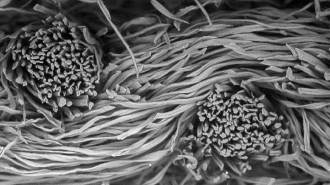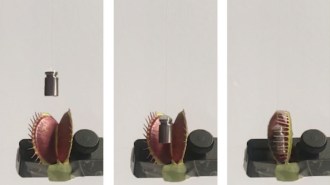Materials Science
-
 Materials Science
Materials ScienceThese weird, thin ice crystals are springy and bendy
Specially grown fibers of frozen water bend into curves and spring back when released.
-
 Animals
AnimalsThe teeth of ‘wandering meatloaf’ contain a rare mineral found only in rocks
The hard, magnetic teeth of the world’s largest chiton contain nanoparticles of santabarbaraite, a mineral never seen before in biology.
-
 Physics
PhysicsA newfound quasicrystal formed in the first atomic bomb test
Material formed in the wake of the first atomic bomb test contains a strange material that is ordered but that is not a standard crystal.
-
 Materials Science
Materials ScienceMorphing noodles start flat but bend into curly pasta shapes as they’re cooked
Shape-shifting pasta could potentially cut down on packaging and save space during shipping.
-
 Health & Medicine
Health & MedicineCapturing the sense of touch could upgrade prosthetics and our digital lives
Haptics researchers are working on ways to add touch to virtual reality, online shopping, telemedicine and advanced artificial limbs.
-
 Materials Science
Materials ScienceMicroscopic images reveal the science and beauty of face masks
Important insights into the particle-filtering properties of different fabrics also offer a sense of the unseen, textured world of face masks.
-
 Materials Science
Materials ScienceThis soft robot withstands crushing pressures at the ocean’s greatest depths
An autonomous robot that mimics the adaptations of deep-sea snailfish to extreme conditions was successfully tested at the bottom of the ocean.
-
 Math
MathHow one physicist is unraveling the mathematics of knitting
Understanding how knots influence textile properties could lead to bespoke materials.
-
 Tech
TechA robot arm toting a Venus flytrap can grab delicate objects
By attaching electrodes to the plant’s leaves, researchers found a way to snap its traps shut on command.
-
 Animals
AnimalsThe diabolical ironclad beetle can survive getting run over by a car. Here’s how
The diabolical ironclad beetle is an incredibly tough little creature. A peek inside its exoskeleton reveals what makes it virtually uncrushable.
-
 Physics
PhysicsThe first room-temperature superconductor has finally been found
A compound of carbon, hydrogen and sulfur conducts electricity without resistance up to 15° C, but there’s a catch: It works only under high pressure.
-
 Physics
PhysicsFundamental constants place a new speed limit on sound
Physicists propose a new maximum rate that sound waves can travel under conditions normally found on Earth — 36 kilometers per second.